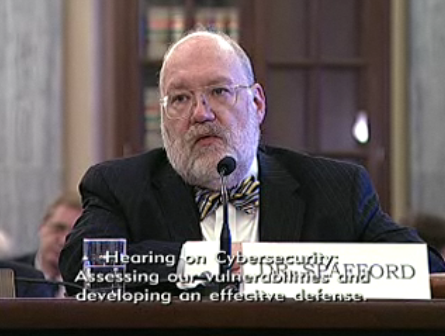Posts tagged initiatives
Page Content
This time, the Senate
On March 19, I had an opportunity to testify before the Senate Committee on on Commerce, Science, and Transportation. The hearing was entitled Cybersecurity -- Assessing Our Vulnerabilities and Developing An Effective Defense.
I was asked to include information on research problems, educational initiatives, and issues regarding the current state of cyber security in the nation. As is usual for such things, the time between the invitation and the due date for written testimony was short. Thus, I didn't have the time to delve deeply into the topic areas, but could only address the things that I already had on hand -- including some posts from this blog that I had written before. The result was a little longer than the other statements, but I think I covered more ground.
One hint for people testifying before Congress on such things: you can't depend on how long you will have for spoken remarks, so be sure any points you want to make are in your written testimony. In this case, the hearing was limited to about 75 minutes because there were several votes scheduled on the Senate floor, and the committee needed to adjourn to allow the Senators to attend the votes. And, as is common for too many hearings, there weren't many of the committee members present; I believe the hearing began with only two of the 25 members present, and some movement of members in and out to reach a maximum of four seated at any one time. In this case, the chair (Senator Jay Rockefeller of West Virginia) apologized to us several times for the low turnout. However, many (all?) of the staff and aides were present, so I'm certain the gist of the testimony presented will be considered.
The Senator made a nice introductory statement.
My written testimony is available on my website as well as the committee site. My oral statement was from rough notes that I modified on the fly as I listened to the other testimony (by Jim Lewis, Eric Weiss and Ed Amoroso). That statement, and the whole hearing, are available via the archived hearing webcast (my remarks start at about 46:30 into the webcast). If I get a transcribed version of those remarks, I will post them along with my written testimony on my website in the "US government" section.
Comments by the other speakers were good overall and I think we collectively covered a lot of ground. The questions from the Senators present indicated that they were listening and knew some of the problems in the area. The comments from Senator Nelson about the intrusions into his systems were surprising: several Senate security staff were present at the hearing and indicated to me that his remarks were the first they had heard of the incidents! So, the hearing apparently set off an incident-response exercise -- separate from responding to my presence in the building, that is. ![]()
Will this hearing make a difference? I don't know. I've been testifying and saying the same things for over a dozen years (this was my 8th Congressional hearing testimony) and things haven't gotten that much better...and may even be worse. Senator Rockefeller has indicated he intends to introduce legislation supporting more funding for students studying cyber security issues. There was some good news coverage of all this (e.g., FCW and CNet).
I am told that there will be more hearings by this committee. Some House committees have been holding hearings too, and the President's 60 day review continues apace. The added attention is great, but with the sudden interest by so many, the result may be more confusion rather than resolution.
Stay tuned.
As a reminder, if you want to know about my occasional postings such as this but don't want to subscribe to the RSS feed, you can subscribe to the mailing list.
Also as a reminder, there is my tumble blog on security issues, with links to items on the news and WWW of possible interest to those who find my ramblings and rants of interest.
Presidential Politics
If you are in the United States, it has been nigh-on impossible to watch TV, read a newspaper, follow a blog, or (in some states) get your paper mail without something about the upcoming election being present. Some of this has been educational, but a huge amount of it has been negative, vague, and often misleading. That’s U.S. politics, unfortunately—the majority of voters don’t really bother to educate themselves about the issues and the media does an uneven job of reporting the truth. For many voters, it comes down to only one or two issues they care passionately about, and they vote for a candidate (or against one) on those simple issues. For instance, there are many voters who will base their votes solely on a candidate’s perceived position on gun control, access to legal abortions, tax policy, or other single issues without thinking about all the position issues. (And, as I note below, most of these single issues aren’t really under the control of the President no matter who is elected.)
Of course, the US political system tends to reinforce this binary choice procedure, as we have long had only two really major parties. Parliamentary systems seem to encourage more parties, although even then there appears to be only two major ones, often oriented around the same approximate social/political poles: a conservative party, and a liberal (labor) party.
So, in the U.S. we have candidates from both major parties (and many minor ones) campaigning—explaining their positions, offering their plans for when they are in office, and trying to instill voter confidence and trust. (And too often, offering innuendo, misquotes and outright untruths about their opponents.)
What none of them say, and the media doesn’t either, is that very few of the promises can really be certain of being kept. And in large part, that is also a nature of government.
The President has a limited set of powers under the Constitution. He (or she) is responsible for the execution of the laws of the United States. The President is the Commander-in-Chief of all the armed forces and is responsible for commanding them in defense of the country and upholding the law (including treaties). The President is the chief executive agent of all the various Cabinet agencies, and of a number of offices and commissions. The President appoints a large number of officials (including judges and ambassadors), but doesn’t have the power to remove many of them.
Most importantly, the President does not make new laws. Laws are passed by Congress, usually with the assent of the President, although a 2/3 majority of both houses of Congress may pass laws to which the President objects. The President is then responsible for ensuring that those laws are carried out, with recourse to the Courts if there are questions. If the President fails to enforce the laws, Congress may take some punitive actions, or even impeach the President…if they have the political will.
So, back to the candidates. If you listen to their speeches, they offer to change tax law, spend more on energy issues, change health care, and a number of other important domestic issues. What they don’t point out, however, is that they will have no authority as President to do most of those things! Instead, Congress will need to pass authorizing legislation that is signed by the President. The President can certainly propose that Congress enact those changes, but Congress needs to craft and pass legislation that enables the President to act, and that allocate necessary funds, and that also create/remove administrative structures that may be involved. This legislation can include whatever other items that Congress adds in to the bill, including items that may be completely unrelated to the main topic. The President then must decide whether to sign the bill and act to implement its provisions.
So, the most a new President can do is to propose legislation to embody his/her campaign promises, and to work for its passage. What usually happens is that the size of the win in the election serves as a political measure of how much the population is aligned with the new President’s positions, and this can help get a particular agenda passed…or not. Of critical importance is also the issue of whether one or both houses of Congress are controlled by the same party as the new President, and by what margin.
Thus, there should probably be more attention paid to the candidates running for Congress and their particular positions on important issues. In many venues, however, the majority of the attention is focused on the Presidential contest. Some other states are also dealing with contentious state initiatives, tight governor races, and other local issues that help further obscure the Congressional races.
Now, how does this apply to cybersecurity, the ostensible topic of this blog? Or education? Or privacy? Or other topics we focus on here?
Well, as I will address in my next posting, the two main Presidential candidates have made some comments on cyber security, but I have not been able to find any coverage of any current candidate for Congress who has mentioned it. It is basically invisible. So is privacy. Education has gotten a little mention, but not much. And given the more overt, pressing issues of the economy, the deficit, health care, energy dependence, and war in the Middle East, it seems unlikely that any Congressional candidate has bothered to think much about these cyber issues, or that they have received much further thought from the Presidential candidates. (Too bad cyber security can’t be part of the mud slinging—it might raise its profile!)
Of course, with the economy in such sad shape, and some of the other severe problems being faced by the U.S., one might ask whether cyber should be a priority for the new President. I would answer yes, because the problems are already here and severe (although not as obvious as some of the other problems), and it will take years of major effort simply to keep even with the current sad status. The problems in cyber cannot be fixed in a crash effort devoted at any future time, and until they are addressed they will be a drain on the economy (in 2006, the FBI estimated the loss to computer crime in the US to be $67 billion—almost 10% of the recent economic bailout), and a threat to national security. Thus, deferring action on these issues will only make the situation worse; we need to initiate a sustained, significant program to make some important changes.
There are some things that the new President can do, especially as they relate to the military, law enforcement, and some other agencies in the Executive Branch. This is potentially cause for some glimmer of hope. I intend to blog some on that too, with a list of things that should be considered in the new administration.

